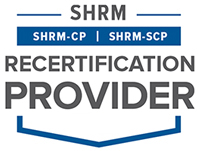+1-800-385-1627
support@hrtrainonline.com
0 items
How A Manager Can Identify and Deal With A Toxic Workplace Bully
60 Minutes
6 months
33373

Group Attendees: Any number of participants
Recorded Version: Unlimited viewing for 6 months ( Access information will be emailed 24 hours after the completion of live webinar)

The use of this seal confirms that this activity has met HR Certification Institutes (HRCI) criteria for recertification credit pre-approval.
This activity has been approved for
1 HR
(General) recertification credit
 HRTrainOnline is recognized by SHRM to offer Professional Development Credits (PDCs) for the SHRM-CP® or SHRM-SCP®.
?
HRTrainOnline is recognized by SHRM to offer Professional Development Credits (PDCs) for the SHRM-CP® or SHRM-SCP®.
?
1-hour and 15 minute concurrent conference session = 1.25 PDCs.
3-hour e-learning course = 3 PDCs.
Workplace bullying is a pervasive problem that can cause significant harm to both employees and organizations. It is defined as repeated, harmful behaviors that are directed towards one or more employees and create a hostile work environment.
Workplace bullies may engage in behaviors such as verbal abuse, physical intimidation, spreading rumors, and sabotage. These behaviors can lead to decreased morale, increased turnover, and reduced productivity.Managers play a critical role in identifying and dealing with toxic workplace bullies. They are responsible for creating a safe and healthy work environment, and addressing workplace bullying is a key part of that responsibility. To do so, managers must be aware of what constitutes workplace bullying, including both overt and covert behaviors. They must also be able to recognize the impact that workplace bullying has on employee well-being, productivity, and morale.
Dealing with a toxic workplace bully requires a multifaceted approach that involves both addressing the behavior of the bully and improving the overall workplace culture. Managers should have clear policies in place for reporting and addressing workplace bullying, and they should work with HR to investigate any complaints. They should also communicate expectations for workplace behavior and hold employees accountable for their actions. In addition, managers should work to promote a positive workplace culture that values respect, inclusion, and open communication. By taking these steps, managers can create a work environment that is safe, supportive, and conducive to employee success.
Why should you Attend:
- Increase awareness: Attending the training will help managers increase their awareness of what constitutes workplace bullying and how it impacts the workplace
- Develop skills: The training will provide managers with the necessary skills to identify and deal with toxic workplace bullies effectively
- Protect employees: By attending the training, managers can learn how to protect employees from the harmful effects of workplace bullying, including decreased morale and productivity, increased turnover, and reduced well-being
- Promote a positive workplace culture: Managers who attend the training will learn strategies for promoting a positive workplace culture that values respect, inclusion, and open communication
- Improve team dynamics: Dealing with a toxic workplace bully can significantly improve team dynamics, leading to increased collaboration, productivity, and employee satisfaction
- Avoid legal issues: By addressing workplace bullying, managers can avoid legal issues and protect the organization from liability
- Demonstrate leadership: Attending the training and implementing strategies to identify and deal with toxic workplace bullies can demonstrate leadership and improve the manager's reputation as a fair and supportive leader
Areas Covered in the Session:
- Understanding workplace bullying
- Recognizing the impact of workplace bullying
- Identifying toxic workplace bullies
- Responding to workplace bullying
- Developing policies and procedures
- Creating a positive workplace culture
- Holding employees accountable
- Preventing workplace bullying
Who Will Benefit:
- Small Business Owners
- Leaders
- Managers
- Team Leaders
- Project Managers
- Department Heads
- Supervisors and anyone in Leadership Role
 Carolyn D. Riggins Carolyn D. Riggins founded CDR Consulting Services, LLC, a consultancy firm focusing on helping businesses and organizations enhance their performance and leadership teams for success.
With Ms. Riggins' 35 years of experience in the financial industry working with businesses and 24 years of experience in management roles, her consultancy service provides invaluable insights and expertise to clients looking to improve their business and leadership capabilities.
Carolyn D. Riggins Carolyn D. Riggins founded CDR Consulting Services, LLC, a consultancy firm focusing on helping businesses and organizations enhance their performance and leadership teams for success.
With Ms. Riggins' 35 years of experience in the financial industry working with businesses and 24 years of experience in management roles, her consultancy service provides invaluable insights and expertise to clients looking to improve their business and leadership capabilities.
CDR Consulting Services offers a range of services, including training, coaching, team development, and critical gap detection. Ms. Riggins works with CEOs, business leaders, and managers to identify areas of improvement within their organizations and provides customized solutions to address these areas. Her training and coaching programs are designed to help individuals and teams develop the necessary skills and knowledge to succeed in their roles.
Ms. Riggins' team development services focus on creating a culture of collaboration and communication within organizations. Through her team-building programs, she helps teams develop a shared vision, enhance their problem-solving abilities, and increase their productivity. Her critical gap detection services enable clients to identify and address gaps in their business performance and leadership teams, ensuring that their organizations are well-positioned for growth and success.
With CDR Consulting Services, clients can benefit from Ms. Riggins' extensive knowledge, experience, and expertise in the financial industry and leadership development. Her consultancy service provides customized solutions that help organizations build strong, successful leadership teams, and achieve their goals.
